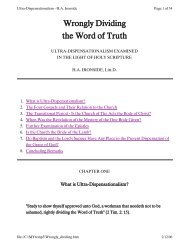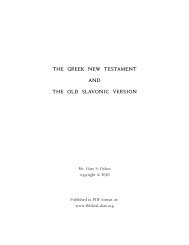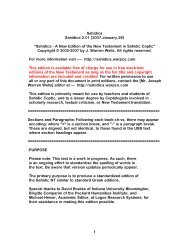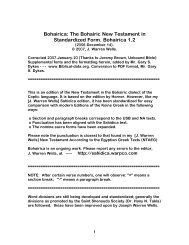The Meaning of the Word "ISRAEL" and Its ... - Biblical-data.org
The Meaning of the Word "ISRAEL" and Its ... - Biblical-data.org
The Meaning of the Word "ISRAEL" and Its ... - Biblical-data.org
Create successful ePaper yourself
Turn your PDF publications into a flip-book with our unique Google optimized e-Paper software.
that both verbs reflect a passive nuance! That is¯Jacob is acted upon by God, Jacob is<br />
empowered by God! Such is <strong>the</strong> Syriac text.<br />
<strong>The</strong> Greek LXX text varies, as printed in Rahlfs edition, only one Greek verb (<strong>of</strong><br />
<strong>the</strong> two Hebrew verbs under discussion) is shown, which verb reflects (apparently)<br />
both Hebrew verbs, Rahlfs appears as such: [dunatoj, appears to be a êhanging nominativeê]<br />
Genesis 32:28 (29)<br />
εἶπεν δὲ αὐτῷ Οὐ κληθήσεται ἔτι τὸ ὄνομά σου Ιακωβ, ἀλλὰ Ισραηλ ἔσται τὸ ὄνομά σου,<br />
ὅτι ἐνίσχυσας μετὰ θεοῦ καὶ μετὰ ἀνθρώπων δυνατός.<br />
A number <strong>of</strong> LXX manuscripts add a future tense, middle voice verb [esh] after<br />
êmenê or êpowerê. <strong>The</strong> one verb <strong>of</strong> <strong>the</strong> Rahlfs edition is an aorist tense active voice<br />
verb. <strong>The</strong> LXX translators may herein display some confusion as regards <strong>the</strong>ir rendering<br />
<strong>of</strong> <strong>the</strong>se two original Hebrew verbs, one being a perfect, <strong>and</strong> <strong>the</strong> second an imperfect<br />
tense/aspect.<br />
We thus note how several early translations rendered <strong>the</strong>se Hebrew verbs <strong>and</strong><br />
prepositions, in so doing we have hopefully gained some insight in our attempt to underst<strong>and</strong><br />
just what <strong>the</strong> literal text <strong>and</strong> context is conveying to <strong>the</strong> reader in our day<br />
<strong>and</strong> in times past.<br />
Israel is also used in a variety <strong>of</strong> o<strong>the</strong>r contexts: as a title describing a people called<br />
Israel, or for <strong>the</strong> physical l<strong>and</strong> <strong>of</strong> <strong>the</strong> country <strong>of</strong> Israel, or for <strong>the</strong> 10 nor<strong>the</strong>rn tribes as<br />
distinguished from <strong>the</strong> two sou<strong>the</strong>rn tribes. It is also used in <strong>the</strong> New Testament for<br />
earthly peoples (believers <strong>and</strong> non-believers) <strong>and</strong> a heavenly (spiritual) group <strong>of</strong> believers<br />
[Hebrews 12:22, <strong>and</strong> Philippians 3:2,3]. Most <strong>of</strong> <strong>the</strong>se usages are self evident,<br />
but much <strong>the</strong>ological discussion revolves around <strong>the</strong> heavenly <strong>and</strong> earthly Israelites,<br />
<strong>and</strong> involves <strong>the</strong> church <strong>of</strong> this present dispensation. [do refer to <strong>the</strong> essay titled: ê<strong>The</strong><br />
Church Extraordinary!ê, seen on <strong>the</strong> website¯www.biblical-<strong>data</strong>.<strong>org</strong>.]<br />
7






